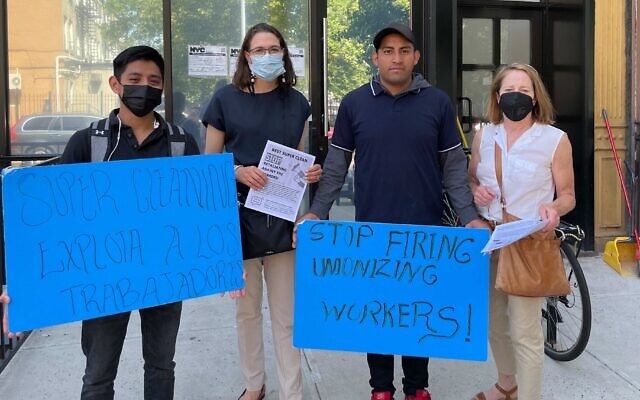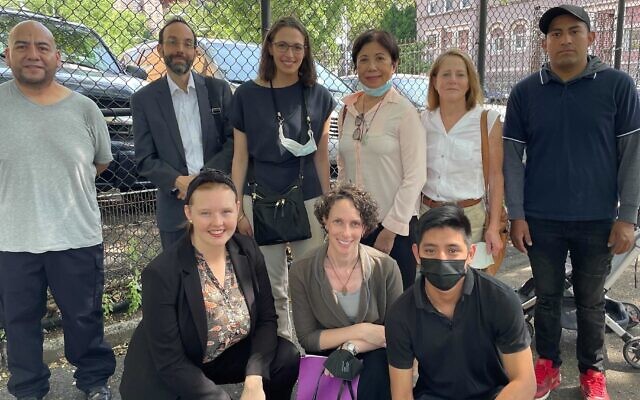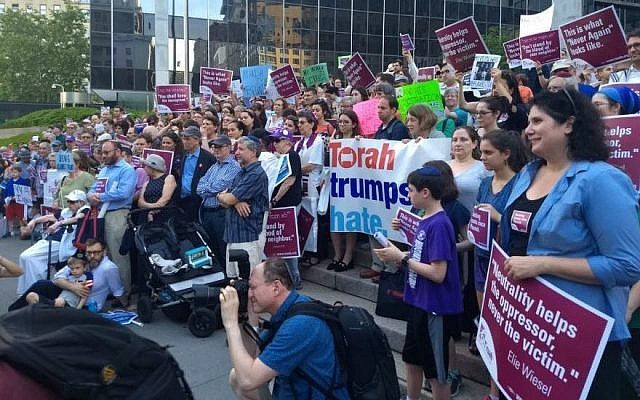New York Jewish Week – Six local rabbis plan to deliver a letter to the Williamsburg, Brooklyn-based construction and demolition company on the morning of Wednesday, June 15. The letter, which was based on Jewish values and teachings, was meant to urge Jewish owners to reconsider their company’s working conditions and policies.
However, instead of a simple drop-off, the rabbis spent about 90 minutes with a representative of Best Super Cleaning, owned by Hasidic. The team went into the company with concrete concessions for mostly Latino and immigrant workers.
“It was an unexpected meeting,” Rabbi Rachel Goldenberg, founder of Malakhut, a progressive Jewish community in Queens, told New York Jewish Week. “We put forward some agreements, some confidence-building measures and some commitments left to keep certain things in place to allow for better direct communication between workers and management.”
The sudden bargaining session between rabbis and business owners was part of a larger campaign, which combined with leftist Jewish activist organizations T’ruah, the Rabbinic Call for Human Rights and the Laundry Workers Center for Racial and Economic Justice for Jews. New York-based, member-led organization that advocates for better working conditions for laundry, warehouse, food service and construction workers in New York City and New Jersey.
Sophie Allman-Golan, director of strategic communications for JFREJ, explained that campaigns are very drawn out with management – it’s rare for a meeting to sit down immediately.
“We think so [the meeting] It was so successful because of T’ruah and our teammates at JFREJ,” said labor organizer Mahoma Lopez, founder and co-director of the Laundry Workers Center, who accompanied the rabbis on Wednesday. “They wrote the letter and are putting a lot of pressure on the employer and a lot of people are watching.”
The issue for Best Super Cleaning’s employees was their poor working conditions – specifically the lack of breaks and paid time off. Adelso Escalante, a 20-year-old immigrant from Guatemala, has worked there for three years. In a conversation with New York Jewish Week, he described how lifting heavy objects up and down stairs, without rest or breaks, and with too few days off, increased tension and pain in his knees. His condition became so critical that he had to be hospitalized for several days earlier this month.

While representatives from each group met with management during an impromptu meeting, other members of each group held up signs and flew to passersby in the neighborhood. (via JFREJ/JTA)
Escalante described how many of his coworkers also had stomach problems because of how late their lunch breaks were—often starting work before dawn, they didn’t break until 3 or 4 a.m., or sometimes not at all. In addition, he said that he was not provided with proper personal protective equipment to protect him from dust and other chemicals that made him work day and night, which led to several ailments in the team.
Escalante had requested sick days several times with his mentors – a request which he said went unanswered. “I was sick but it was not very serious. I returned to work. I worked during the whole pandemic, until 2020. I am a responsible person and do my job,” Escalante said in Spanish. “I felt bad , but I still went back to work. They didn’t say anything. Thanks or nothing.”
Then, last week, a co-worker was fired for not coming to work because of illness, he said.
“We decided we weren’t going to tolerate this anymore,” Escalante said. “My coworkers had injuries and many of them had to stop working because of it.”
Laundry Workers Center had “launched”cabricancos campaign“Early May. Thirty-eight activists from Best Super Cleaning, along with dozens of local supporters from the LWC, JFREJ and T’ruah, marched to their owners’ Williamsburg office to demand better conditions.
Since the start of the campaign – which has included picketing campaigns in Williamsburg and fliers to members of the community, sometimes on Shabbat – activists say they are getting a daily lunch break at a more opportune time.
“Ever since I’ve been working with the Laundry Workers Center, I’ve learned that a lot of things that happen at my job shouldn’t be like this,” Escalante said.
But there is still more to be done. Lopez said she also helped file a lawsuit against Best Super Clean for their labor practices; According to New York State law, all employees five sick days a year, Lopez also suspects the company is retaliate against workers for attempting to organize — in addition to Escalante, Lopez said, five other workers have been fired without reason in recent months.
Another strategy Lopez had, however, was to partner with T’ruah and JFREJ. LWC and JFREJ previously secured support together in 2015 Midtown’s B&H Photo. unionization efforts for workers of, Hasidic-owned electronics retailer. Maybe, he thought, if fellow Jews advocated for the workers, the company owners would hear their arguments in a new light.

Representatives from JFREJ, T’ruah and the Laundry Workers Center demonstrated at Best Super Cleaning’s offices on Wednesday morning to demand better working conditions for employees. (via JFREJ/JTA)
LetterBest, addressed to Super Clean owners Josef Jakobovitz, Benjamin Mehrle and Jakob David Segelbaum, was released upon campaign announcement in early May. Signed by 35 local rabbis, it quoted Deuteronomy: “You must not abuse any needy and destitute laborer, whether a fellow Israelite or a stranger from the communities of your land.”
According to Goldenberg and Lopez, the plan on Wednesday morning was to leave the letter and walk away. But during the meeting, Best Super Cleaning’s representative agreed to reinstate the employee who was fired last week, and expressed a desire to speak to lawyers for other employees who were fired.
Best Super Cleaning declined to comment on the New York Jewish Week meeting.

Example: Protesters at a Jewish rally at Immigration and Customs Enforcement Headquarters in New York City demonstrate against the government’s border separation policy, June 21, 2018. (Ben Sales/JTA)
Both Goldenberg and Lopez said management also agreed to meet with a representative from each construction team once a month to open up dialogue and communication between workers and management. He also expressed interest in hiring bilingual supervisors for construction teams, as well as providing better training for team managers.
In response, the LWC agreed not to picket and lay hands on Shabbat in Williamsburg.
“The evidence will follow, but I’m optimistic,” Goldenberg said. He added that the LWC plans to meet with BEST Super Clean again in the coming weeks to check on the progress.
“We depend on each other—our communities are also intertwined, and it’s really worthwhile to be part of a campaign that’s so local,” Goldenberg said. “As a colleague of mine told management, ‘this one will be real’ kiddush hashem To let the Jewish community know that this Jewish-owned business is run well by their workers.'”
Lopez – who noted Friday morning that employee management promises to re-hiring had not yet been contacted by her former bosses – is hopeful but skeptical. “Sometimes employers say things when they’re under pressure but don’t follow through,” he said. “I think the company is too scared, so they were open” [to meeting], I don’t know if they are just trying to improve their image.”
As for Escalante, he said he loved seeing how many New Yorkers were willing to stand up for him. “We are immigrants, we are Latino, we are Hispanic. We need respect. We are also human beings,” he said. “I am so happy to know that I have the support of so many people who are really able to help “